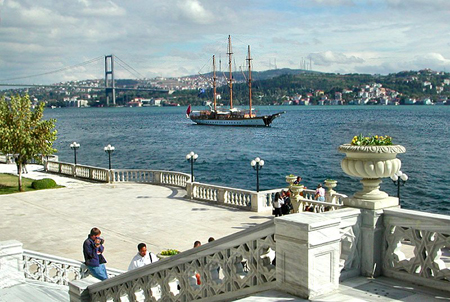Istanbul, Turkey -- Over three days in early October, top economic policymakers plus several hundred global bankers held parallel meetings at posh hilltop venues overlooking the fabled Bosporus, where Europe ends and Asia begins. Serial discussions analyzed the 2007/2008 financial collapse, the measures put in place to clean up the mess, and various regulatory proposals intended to prevent a recurrence. Drawing from panels, briefings, press conferences, and conversations -- four broad messages emerge from this annual gathering of the International Monetary Fund and World Bank.
First, the worst of the financial crisis is behind us, or as IMF Managing Director Dominique Strauss-Kahn put it, "we've turned the corner." However, this self-congratulatory message, voiced earlier by G20 leaders at Pittsburgh, is tempered with caution. There is a strong belief that while coordinated global stimulus has pulled the global economy back from the abyss, normal economic activity has not yet resumed and it is too early to cut back on the huge increases in government spending that have propped up consumer demand.

Bosporus, at the intersection of Europe and Asia.
Second, economic power is shifting away from the United States and Europe to the fast growing emerging economies, particularly China and India. Virtually no-one in Istanbul, neither bankers nor policy makers, laments the passing of the euro-atlantic focused G8 to the more representative and diverse G20. But now comes the hard part. As the IMF is being handed increased responsibility over the world economy, how does it become more like the G20? Currently, the fund is controlled by the Americans and Europeans, each having a veto on important decisions. Leaders at Pittsburgh endorsed a five percent increase for emerging market votes in the IMF. But the rising developing nations want more, while the small European nations, that are expected to give up votes, are resisting. Regrettably, this looming clash in the IMF is likely to surface within the G20, once crisis management ends. One creative suggestion comes from Stan Fischer, the former number two man at the IMF who now heads the Bank of Israel. He suggests that the 24 nation IMF board of directors should be replaced by the G20.
Third, there is an urgent need to remedy the huge financial and trade imbalances between North America and East Asia that experts believe helped precipitate the crisis. New York University professor Nouriel Roubini told the bankers that a decade of over-consumption in the United States led to huge increases in household debt, while in Asia excess savings caused a huge increase in dollar reserves, a mismatch that distorted normal trade relations. Toyoo Gyohten, a leading Japanese thinker on finance, agreed, and said American consumers have to adjust and curb their appetite for cheap Asian products. But he is not optimistic that the needed exchange rate adjustments--the dollar declining against the Chinese yuan--will occur.
Fourth and finally, there is the perceived risk that as the crisis eases, all of us, and the world economy in general will simply revert to business as usual. University of Chicago economics professor and former IMF chief economist Raghuram Rajan says "while the crisis has been painful, it may have been painful enough" to force the kind of systemic changes that should be put in place. The problem here is that there as yet is no agreement on what regulatory reforms are needed and how they can be implemented. Currently there is a maze of national regulations with very few international standards. In accounting, for example, the Americans do it one way, the rest of the world another. Bankers rightfully worry that tough regulation on risky transactions in America could simply force those operations off shore, to a place where they are allowed.
Policy makers in Istanbul warned bankers that they shouldn't fight additional regulation. But Josef Ackermann of Deutsche Bank, said "stricter regulation could be damaging if it is introduced too quickly and unevenly." David Mulford, the former US Treasury official who is vice-chairman of Credit Suisse, lamented that "as yet there is no consensus on how to balance the need for finance", essential for economic growth, with cross-border measures that "curb the excessive financial risk-taking" that precipitated the crisis.
